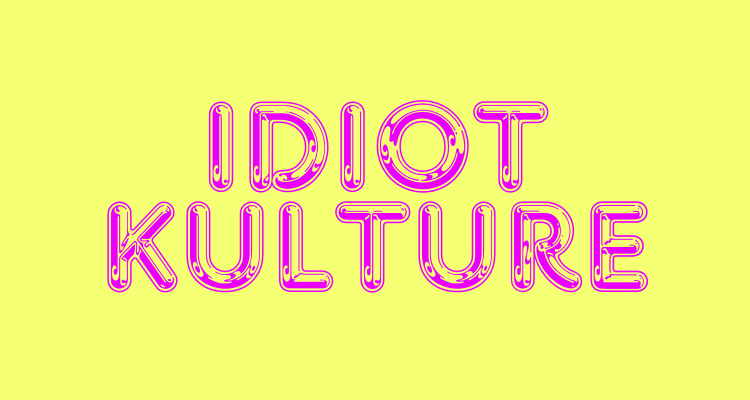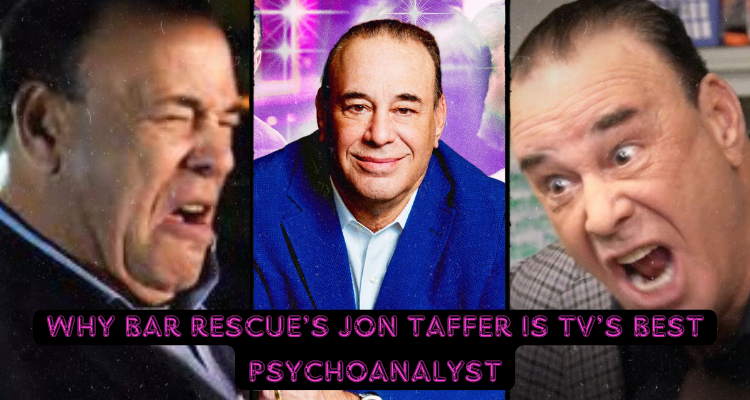Bar Rescue stands out not just as a business makeover show, but as an unexpected case study in Lacanian psychoanalysis. Host Jon Taffer doesn’t simply fix struggling bars—he forces their owners to confront their own misrecognition, encounter the Real, and undergo a Symbolic restructuring.
Through his aggressive interventions, Bar Rescue mirrors the fundamental process of clinical psychoanalysis (with a materialist twist), where the subject is forced to reckon with the lies they tell themselves and reconfigure their relationship to reality.
The Imaginary: The Owner’s Self-Deception
Before Taffer enters the scene, most bar owners operate within an Imaginary self-perception that shields them from reality. They believe they’re competent, that the bar’s problems stem from external factors (bad staff, poor location, the economy), and that they remain in control of their business. This Imaginary Order is sustained through selective perception and rationalization:
- Owners ignore financial losses or downplay their role in the bar’s failure.
- They misrecognize (méconnaissance) their own incompetence, seeing themselves as hard-working, visionary entrepreneurs despite mounting evidence to the contrary.
- Employees and family members often reinforce these delusions, either out of loyalty or fear of confrontation.
In Lacanian terms, the bar itself often serves as a fantasy object (objet a)—a thing in which the owner invests their identity and desires, even when it’s clearly failing them.
The Call For Help
Taffer doesn’t just appear out of nowhere. As the opening of every episode states:
“With nowhere left to turn, they’ve decided to pull back the doors, bust open the books, and make a call for help… to Bar Rescue.” [*glass shatters*]
This moment is significant—not because the owner has truly grasped the reality of their failure, but because their previous justifications are no longer sustainable. They still cling to the belief that the problem lies outside of them—bad employees, poor market conditions, a changing neighborhood—rather than recognizing that the bar’s failure is a symptom of their own deeper dysfunction.
In Marxist terms, people do not spontaneously revolt or change their mode of production out of intellectual realization—they do so when material conditions force their hand. The same logic applies to bar owners on Bar Rescue:
- They don’t call Taffer because they’ve rationally accepted their incompetence.
- They call him because they’re out of money, drowning in debt, or facing closure.
- They’re still trapped in méconnaissance, thinking they need a quick external fix rather than fundamental restructuring.
In a Lacanian sense, this moment is an encounter with the Real—the point at which reality violently intrudes and exposes the failure of their Imaginary coherence. They may not yet understand the true depth of their crisis, but they can no longer fully deny that something must change.
The Real: Taffer’s Arrival as a Rupture
The Real is the traumatic rupture that shatters the subject’s Imaginary coherence. In Lacan’s framework, it’s that which cannot be fully symbolized or integrated into meaning—it’s what remains unseen, foreclosed, or denied in the subject’s understanding of themselves. Taffer forces the owners to confront this Real of their failure through a variety of methods:
- Raw Data: He presents them with financial losses, video evidence of negligence, and direct comparisons to successful competitors.
- Explosive Confrontation: His aggressive, theatrical outbursts function as a shock to the system, breaking through the layers of rationalization (ideology) that sustain their self-deception.
- Forced Witnessing: Owners are often made to watch hidden camera footage of their staff’s misbehavior or customer complaints, experiencing their failure from an external perspective.
- Binary Confrontation: Taffer doesn’t just tell the owners they’ve failed—he forces them to define why they’ve failed in terms that obliterate their self-image by asking, “Are you lazy or are you stupid?” No answer allows the subject to retreat into their previous justifications, and they can no longer tell themselves that external forces are to blame. Whether they pick lazy or stupid, the result is the same: they must accept their own failure.
Sometimes, Taffer delivers the most brutal encounters with the Real with chilling simplicity, stripping away all pretense and simply saying, “The reality is you’re not very good at this.”
These moments disrupt the Imaginary ego and expose the fundamental lack at the heart of the owner’s self-perception. No longer able to sustain the fantasy that they’re successful, the subject is thrown into crisis.
But here is where the Real presents an unavoidable choice: submit to restructuring or collapse entirely. The fantasy of maintaining control is no longer viable, and the owner must now determine whether they’ll embrace the hard process of transformation or resist and let the business fail.
Restructuring the Symbolic Order
What follows is a classic Lacanian moment of subjective destitution—a breakdown in the subject’s sense of self as they realize the discrepancy between their Imaginary self and the Real. This is often accompanied by guilt and shame, not just at their managerial failures but at the realization that they’ve misrecognized themselves for so long.
However, these moments aren’t just destructive—they’re the gateway to restructuring. The Real isn’t simply about exposing failure; it’s about creating the conditions for Symbolic reordering. The bar owner must pass through this moment of disintegration in order to be reconstituted within a new framework.
Now, Taffer’s role shifts. He moves from the agent of the Real to the Name-of-the-Father (Nom du Père)—the Symbolic authority who provides structure and reintroduces law. In this phase, he:
- Establishes a new set of Symbolic rules (better management, financial discipline, staff accountability).
- Redefines the bar’s identity—not just with a new name, but by forcing the owner to accept a new role within a fully transformed system.
- Reintegrates the owner into a healthier Symbolic framework, where they can now operate successfully within the business world.
Taffer’s Real is painful, but it’s also generative—a necessary rupture that clears the path for a more stable and sustainable Symbolic framework. It functions precisely because it’s rooted in material efficiency rather than personal ego or fantasy. Unlike the failed systems the owner constructed to protect their self-image, this new structure is built on objective, measurable success.
Emotional Trauma and the Bar as Symptom
It’s significant that many of the bar owners in Bar Rescue have unresolved emotional traumas—death in the family, failed marriages, personal struggles—that underlie their dysfunction. The failing bar often serves as a symptom of these deeper issues, an unconscious defense mechanism to avoid dealing with their loss, inadequacy, or guilt.
Taffer’s intervention forces a double rupture:
- The failure of their business.
- The realization that their emotional trauma is entangled in this failure.
Many of the most powerful moments on Bar Rescue occur not when an owner acknowledges their bad business practices, but when they break down over a personal wound they’ve been avoiding. This mirrors the psychoanalytic process, where the subject must confront their unconscious investments before real transformation can occur.
Jon Taffer and the Primacy of Material Reality
However, unlike traditional psychoanalysis which operates at the level of subjective transformation, Bar Rescue is fundamentally materialist in its approach. Jon Taffer doesn’t concern himself with getting bar owners to “believe” in success—he forces success by reconstructing the material conditions that make it possible.
Taffer understands that hospitality isn’t just about a bar’s aesthetic or branding—it’s about creating an environment where customers feel good because the material conditions have been corrected. The true “symbolic shift” isn’t just in the owner’s mind, but in how the bar functions as a social space.
The new concept, name, and branding only arrive after these material changes have been implemented. In Lacanian terms, Taffer doesn’t just restructure the Symbolic Order—he physically reshapes the Real itself. Taffer’s methodology follows a strict sequence:
- Exposing Physical Neglect: Before addressing an owner’s self-deception, Taffer forces them to confront the state of their business in concrete terms—spoiled food, roach infestations, undertrained staff, financial data showing imminent collapse. His interventions begin with reality, not belief.
- Enforcing Practical Systems: He forces compliance with operational structure: bartenders are retrained, cleaning becomes mandatory, and ordering systems are corrected. The owner doesn’t need to accept blame—what matters is that these changes happen.
- Reshaping the Environment: Only after structural issues are addressed does Taffer introduce aesthetic and conceptual changes. This isn’t just about “rebranding” but attaching new meaning to an already-transformed material space. The owner doesn’t symbolically “reinvent” the bar in their mind—the bar itself has already changed, and the new identity follows.
Now, Taffer’s Real is not some neutral force of truth—it’s capitalism’s brutal demand for efficiency, tearing away the failing fantasy of the bar owner and replacing it with market survival. His intervention doesn’t abolish ideology but replaces the failed fantasy of the bar owner with the cold efficiency of market survival.
However, what makes this restructuring distinct is that it doesn’t function ideologically in the traditional sense—it doesn’t require belief, justification, or emotional investment. Taffer doesn’t need the bar owner to “buy in” to a new myth or symbolic vision; he simply needs them to comply with a system that produces material success.
Unlike the Imaginary narratives the owners constructed to rationalize their failures, this system is self-verifying. The bar owner does not need to believe in cleanliness, financial responsibility, or proper staffing. They need only enact the prescribed changes, and the results prove themselves.
In this way, Taffer’s Real is not just the destruction of the old order but the imposition of a new, stripped-down symbolic structure—one where success is purely material, and ideology has no place to hide.
Žižek (Thought) vs. Taffer (Action)
Slavoj Žižek’s critique of ideology suggests that people often act without questioning the ideological structures they’re trapped within. His famous “Don’t act, just think” urges people to step back and analyze why they feel compelled to act before mindlessly participating in a system that sustains their oppression. For Žižek, the most insidious form of ideology is action that merely feels like change—because it allows the subject to remain within the same symbolic order while mistaking motion for transformation.
Taffer, by contrast, inverts this logic: instead of starting with belief, he forces material restructuring first, knowing belief will follow. He doesn’t ask bar owners to contemplate their failures or analyze the ideological conditions that shaped their misrecognition. He obliterates the old order through immediate, tangible interventions—cleaning kitchens, training staff, restructuring pricing models. For Taffer, belief is not a prerequisite for change; change itself produces belief.
A bar owner might say, “I just need a rebrand, new marketing, and a social media push.” But this is exactly the kind of false action Žižek critiques—a superficial shift that allows the subject to feel like they are making progress while avoiding true systemic change.
Taffer rejects this outright. His approach isn’t just “Act first, believe later.” It’s “Act in a way that forces reality to prove itself.” The bar owner doesn’t need to believe in cleanliness, financial responsibility, or leadership at first—but once the new systems are in place and success follows, belief becomes an inevitability.
This is why Taffer is not simply an inversion of Žižek—he is an acceleration of Žižek’s own logic. Instead of stepping back to analyze ideology before acting, he forces material conditions to shift first, creating a new Symbolic order that eventually compels ideological commitment.
Foreclosure and the Failure to Transform
Not every subject successfully crosses the threshold of transformation. Many bar owners experience the rupture of the Real—facing their failure, submitting to Taffer’s intervention—yet ultimately reject the new Symbolic order he offers. Instead of embracing the restructuring, they actively retreat back into the fantasy of their previous self-perception.
This isn’t just regression—it’s foreclosure in the Lacanian sense: a refusal to integrate the Real into their Symbolic framework. Rather than confronting the fundamental truths that led them to ruin, they seal off the rupture and attempt to return to the comfort of misrecognition.
- They restore the old name—symbolically erasing the transformation.
- They abandon new operational structures—reverting to their failed management style.
- They rationalize their failure again, blaming external factors rather than confronting their own role in the collapse.
In Marxist terms, this is a return to false consciousness—a deliberate clinging to ideological comfort rather than adapting to the material conditions that exposed the necessity of change. In psychoanalytic terms, it’s a foreclosure of the Real—a refusal to integrate the traumatic truth that their old ways were unsustainable.
For those who embrace Taffer’s restructuring, the trauma of transformation gives way to a new Symbolic framework, one in which success is possible. But for those who reject it, the cycle of failure repeats. Their foreclosure ensures that even when material reality exposes the lie of their old ideology, they’ll fight to sustain it—even at the cost of their own destruction.
Short-Term Discipline for Long-Term Gains
Bar Rescue is more than a business reality show—it stages a Lacanian psychoanalytic drama in every episode. It’s a mass-market psychoanalysis for capitalism, where failure isn’t analyzed– it’s beaten into submission. Or, as Jon Taffer says at the start of every episode: “I don’t embrace excuses; I embrace solutions.”
While Taffer’s intervention initially forces bar owners into submission under capitalist discipline—demanding efficiency, structure, and profit—this isn’t necessarily the end of the story. In fact, by restoring economic viability, he creates the preconditions for experimentation.
A bar that is constantly on the verge of collapse has no room to maneuver; every decision is reactive, dictated by immediate financial catastrophe. But once stabilized, the owner is no longer scrambling for survival—they have the capacity to think strategically, to make intentional choices about the direction of their business.
In this sense, Bar Rescue doesn’t just enforce conformity—it enables a form of long-term self-determination. Once a bar is running successfully, it can begin to:
- Experiment with new service models or niche concepts.
- Expand and hire more staff, allowing the owner to shape labor conditions.
- Use the business as a launchpad for future ventures in entirely different fields.
- Leverage profits to fund or invest in others’ ventures.
The paradox is that submission to capitalist efficiency in the short term can be the very thing that grants the owner autonomy in the long term. The system demands discipline, but once mastered, that discipline becomes a tool for shaping one’s own future.



